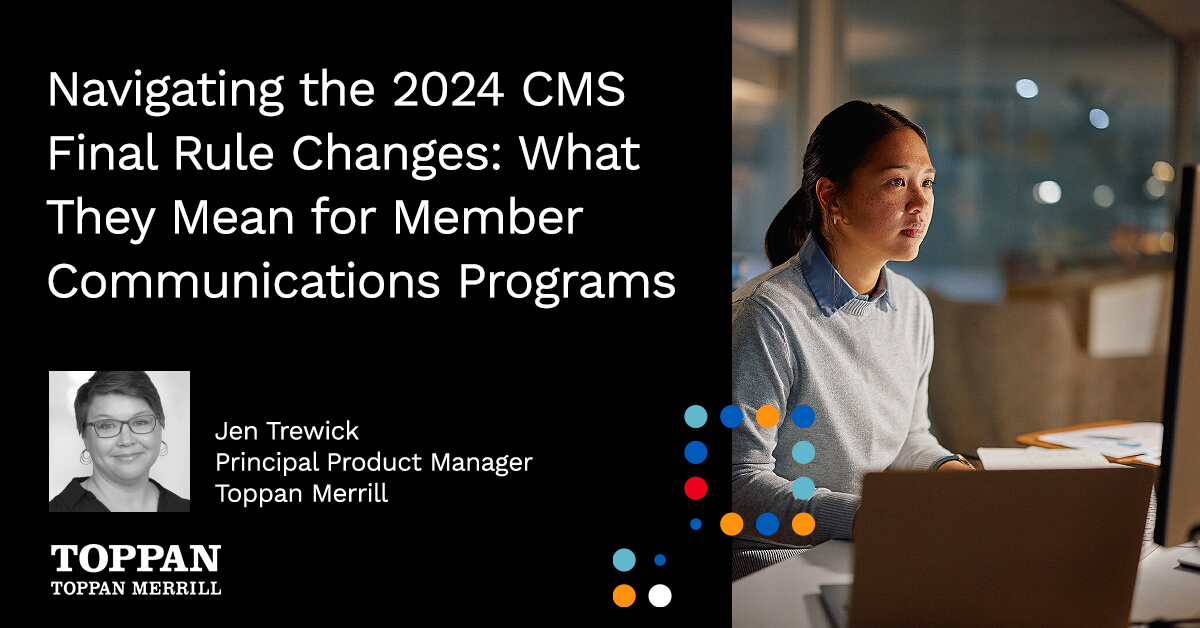We’ve heard the saying, “history repeats itself.” This rings true with yet another Centers for Medicare & Medicaid Services (CMS) rewrite of what constitutes the definition of marketing. On May 10, 2023, CMS released a memo very simply titled, “Definition of Marketing,” however what resulted for Medicare Advantage Organizations (MAOs) and their Third-Party Marketing Organizations (TPMOs) is far from simple. The impact of this change could have far-reaching effects on campaign strategy and timely implementation.
This announcement is surprising because CMS updated its definition of marketing in the April 4, 2019 Final Rule, and bucketed all recognized communications into just two categories, communications and marketing. Over the past three years, the industry limped along with sparse memo updates, before CMS finally released sub-regulatory guidance (heavily relied upon by MAO marketers) to provide a resource tool clearly illustrating which materials fell into each of the two buckets. This becomes significant because each bucket has its own set of requirements. The long-awaited revision of guidance was finally presented in the Medicare Communications and Marketing Guidelines (MCMG), released on February 9, 2022.
Changes to marketing “intent” and “content”
The May 10, 2023 memo emphasizes a recalibrated approach to the “intent” and “content” of CMS’ marketing definition as follows:
- CMS’ criteria for establishing marketing intent is satisfied when the material is “intended to draw a beneficiary’s attention to plan or plans, influence a beneficiary’s decision-making process when selecting a plan, or influence a beneficiary’s decision to stay enrolled in a plan (that is, retention-based marketing).”
- CMS’ criteria for content in qualifying a piece as marketing “is met when any material or activity includes or addresses plan benefits, benefits structure, premiums, or cost sharing; measuring or ranking standards, or rewards and incentives.”
Why did CMS feel the need to reinvent the definition of marketing so soon? Through observations, audits and significant intake of both data and complaints, CMS learned their own assumptions about the amount of information required to influence beneficiaries’ decision-making processes, were off course. While CMS has allowed the “mentioning of widely available benefits (i.e., vision, dental, premium reduction, and hearing),” to be socialized generically under the premise such ads were not truly “marketing,” CMS states, “We did not believe the general descriptions were made with sufficient intent to draw attention to a particular plan or subset of plans.” Essentially, CMS did not feel beneficiaries would be basing enrollment decisions on such high-level benefits, barely achieving a categorical mention as available through a plan. However, consumer behaviors surprised even CMS.
CMS surveillance prompts change
Seeing a simple banner ad online which states only, “We cover hearing exams,” may not seem enticing enough for beneficiaries to sign on the dotted line for all their health coverage needs — especially without even confirming the plan’s monthly premium amounts or other cost-sharing. Yet if we put ourselves in the shoes of an often-vulnerable Medicare audience, we’d find our mailboxes overflowing with advertisements and feeling overwhelmed. In the fall Annual Election Period (AEP), sleepless nights bear infomercials. Boredom and cell phone surfing give way to pop-up ads. And with geo-fencing now more popular than ever, driving past an insurer’s building enroute to the shopping mall mysteriously prompts their banner ads in your next browser search. The amount of information can be too much to digest. Who wouldn’t be ready to simply throw a dart at seemingly simpler health plan options?
CMS calls out TPMOs’ permeation into health plan marketing, as the primary catalyst for many beneficiaries basing their decisions on minimal information. Long-standing secret shopper programs, conducted by CMS revealed TPMOs’ impact on beneficiaries’ shopping habits. CMS was able to assess the impact of TPMO involvement based on results from CMS’ surveillance methods including tracking enrollments associated with such promotional marketing, auditing recorded calls and evaluating complaints through 1-800-Medicare.
CMS takes action
As a result of CMS’ due diligence, effective July 10, 2023 CMS is implementing the following modification to its marketing definition: “…Any material or activity that is distributed via any means (e.g., mailing, television, social media, etc.) that mentions any benefit will be considered marketing and must be submitted into HPMS. This clarification…will help ensure that beneficiaries have accurate information when shopping for Medicare coverage and are protected from potentially misleading marketing activities.”
CMS’ goal is to protect beneficiaries from misleading marketing activities, and to help them make informed decisions, versus potentially making a blind purchase out of consumer exasperation. However, the quick turnaround required by MAOs to accommodate this announcement is concerning. The short timeline for health plans to comply and launch their campaigns on time might actually be marketers’ greatest concern.
After months already invested in campaign design and strategic sales planning, this CMS announcement could send insurers back to the drawing board to re-conjure messaging that will be less laborious to implement. And if no changes are made, how many advertisements previously considered acceptable for use, will now need to be primed for upload? Do health plans have enough staff to perform the increased number of uploads?
Is CMS’ hindsight 20/20?
What about CMS? Is CMS prepared for the sheer millions of additional uploads that could be taxing their Health Plan Management System (HPMS) during an already abbreviated window of time for an insurer’s pre-season readiness? Does CMS plan to perform more “retrospective reviews” in proportion to the increased volume of advertisements being filed? We look forward to hearing from you, our industry partners, the impact CMS’ new marketing definition has had on your organization’s strategic marketing plans, and your creative insights for tactical accommodations.
How Toppan Merrill Can Help
Toppan Merrill is focused on these, and other CMS requirements, in support of our health plan marketing partners. Using our expertise and insight, we want to partner with you on your marketing and communications materials. From document creation and management, sales enablement, omnichannel communications, printing services, and more, we deliver best-in-class solutions that help you respond quickly to changes in regulations, member needs, and markets.
Learn more about how we can help with your health plan member communications.



